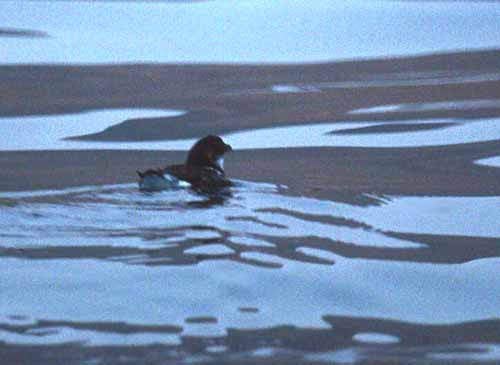 The Diving-Petrels are a small family of four species of small seabirds
in the genus Pelecanoides. They are only found in the southern hemisphere:
two species from South America -- including the Peruvian Diving-Petrel
(left) -- and two circumpolar species, one in the sub-Antarctic and another
in more temperate (but still quite cold) southern waters (as in New Zealand
& Tasmania). All the diving-petrels resemble each other closely, and
are separated on details of breadth & length of their stout bills,
plus details of the distribution of whitish on underparts or face (note
the partial "ear-surround" on this Peruvian species).
The Diving-Petrels are a small family of four species of small seabirds
in the genus Pelecanoides. They are only found in the southern hemisphere:
two species from South America -- including the Peruvian Diving-Petrel
(left) -- and two circumpolar species, one in the sub-Antarctic and another
in more temperate (but still quite cold) southern waters (as in New Zealand
& Tasmania). All the diving-petrels resemble each other closely, and
are separated on details of breadth & length of their stout bills,
plus details of the distribution of whitish on underparts or face (note
the partial "ear-surround" on this Peruvian species).
Although diving-petrels are clearly in the Order Procellariiformes, having "tube-noses" as do albatrosses, shearwaters, and storm-petrels, they have diverged long ago from those groups. Most of the Procellariiformes are masters of the air, gliding for hours above the waves, but the diving-petrels are better adapted for the sea. They have stocky bodies with short wings and thick necks, and fly with whirling wingbeats. In this they quite resemble the completely unrelated auks and relatives (Alcidae) of the northern hemisphere. This is a case of convergent evolution. They are agile swimmers and divers, even in the roughest of seas, and in this they again resemble the auks or penguins. Like alcids, they ride rather buoyantly on the water surface when not diving.
Diving-petrels are generally found singly or in loose groups on the ocean, but they breed in dense colonies, mostly on offshore islands with only a few mainland colonies in protected areas. Nests are in burrows and, as with many colonial seabirds, they arrive and depart those burrows at night to avoid predators. Diving-petrels tend to feed inshore and rarely disperse far from the breeding colonies, although a few individuals have been encountered a fair distance offshore (Carboneras 1992).
Photos: The photo of Peruvian Diving-Petrel Pelecanoides gamotii was taken just off the Paracas Peninsula, Peru, from a small boat on 12 June 1987. Photo © D. Roberson; all rights reserved.
Bibliographic note:
There is no "family book" per se of which I'm aware (there are numerous coffee-table "survey" books that include diving-petrels among other seabirds), but a good introduction to the family, with nice photos of two species onshore, is in Carboneras (1992).
Literature cited:
Carboneras, C. 1992. Family Pelecanoididae (Diving-Petrels) in del Hoyo, J., Elliott, A., & Sargatal, J., eds. Handbook of the Birds of the World. Vol. 1. Lynx Edicions, Barcelona.TOP
Page created 22 Jan 2000